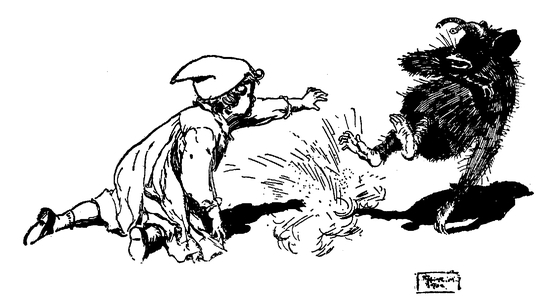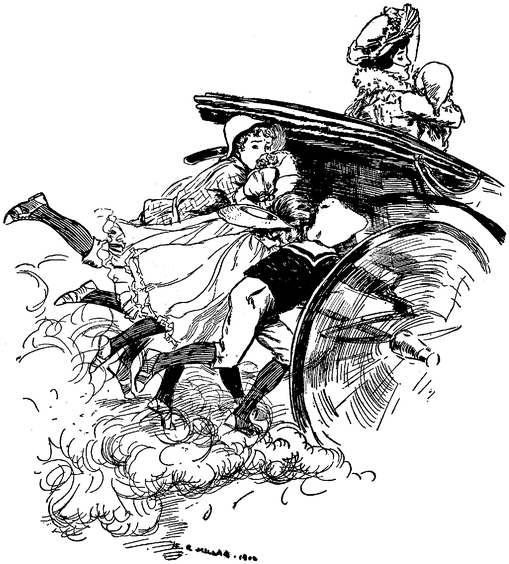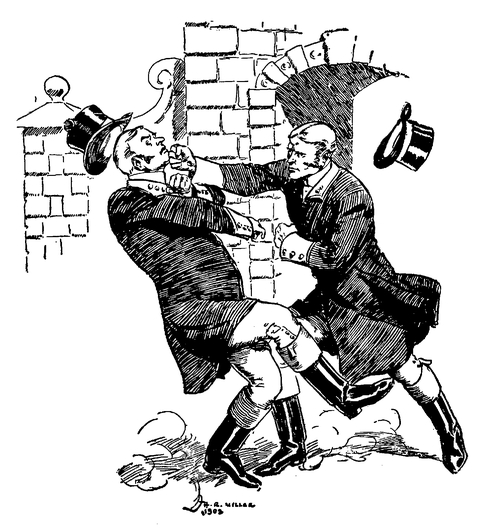Enchanted Castle and Five Children and It (Barnes & Noble Classics Series) (12 page)
Read Enchanted Castle and Five Children and It (Barnes & Noble Classics Series) Online
Authors: Edith Nesbit

BOOK: Enchanted Castle and Five Children and It (Barnes & Noble Classics Series)
10.34Mb size Format: txt, pdf, ePub
“Never mind,” said the hopeful Jane, “we’ll soon find him.”
But this, though easily said, was hard in the doing. They looked and they looked, and though they found their seaside spades, nowhere could they find the Sand-fairy.
At last they had to sit down and rest—not at all because they were weary or disheartened, of course, but because the Lamb insisted on being put down, and you cannot look very carefully after anything you may have happened to lose in the sand if you have an active baby to look after at the same time. Get someone to drop your best knife in the sand next time you go to the seaside, and then take your baby brother with you when you go to look for it, and you will see that I am right.
The Lamb, as Martha had said, was feeling the benefit of the country air, and he was as frisky as a sandhopper.
ah
The elder ones longed to go on talking about the new wishes they would have when (or if) they found the Psammead again. But the Lamb wished to enjoy himself.
ah
The elder ones longed to go on talking about the new wishes they would have when (or if) they found the Psammead again. But the Lamb wished to enjoy himself.
He watched his opportunity and threw a handful of sand into Anthea’s face, and then suddenly burrowed his own head in the sand and waved his fat legs in the air. Then of course the sand got into his eyes, as it had into Anthea’s, and he howled.
The thoughtful Robert had brought one solid brown bottle of ginger-beer with him, relying on a thirst that had never yet failed him. This had to be uncorked hurriedly—it was the only wet thing within reach, and it was necessary to wash the sand out of the Lamb’s eyes somehow. Of course the ginger hurt horribly, and he howled more than ever. And, amid his anguish of kicking, the bottle was upset and the beautiful ginger-beer frothed out into the sand and was lost for ever.
It was then that Robert, usually a very patient brother, so far forgot himself as to say:
“Anybody would want him, indeed! Only they don’t; Martha doesn’t, not really, or she’d jolly well keep him with her. He’s a little nuisance, that’s what he is. It’s too bad. I only wish everybody
did
want him with all their hearts; we might get some peace in our lives.”
did
want him with all their hearts; we might get some peace in our lives.”
The Lamb stopped howling now, because Jane had suddenly remembered that there is only one safe way of taking things out of little children’s eyes, and that is with your own soft wet tongue. It is quite easy if you love the Baby as much as you ought to.
Then there was a little silence. Robert was not proud of himself for having been so cross, and the others were not proud of him either. You often notice that sort of silence when someone has said something it ought not to—and everyone else holds its tongue and waits for the one who oughtn’t to have said it is sorry.
The silence was broken by a sigh—a breath suddenly let out. The children’s heads turned as if there had been a string tied to each nose, and someone had pulled all the strings at once.
And everyone saw the Sand-fairy sitting quite close to them, with the expression which it used as a smile on its hairy face.
“Good-morning,” it said; “I did that quite easily
!
Everyone wants him now.”
!
Everyone wants him now.”
“It doesn’t matter,” said Robert sulkily, because he knew he had been behaving rather like a pig. “No matter who wants him—there’s no one here to—anyhow.”
“Ingratitude,” said the Psammead, “is a dreadful vice.”
“We’re not ungrateful,” Jane made haste to say, “but we didn’t
really
want that wish. Robert only just said it. Can’t you take it back and give us a new one?”
really
want that wish. Robert only just said it. Can’t you take it back and give us a new one?”
“No—I can’t,” the Sand-fairy said shortly; “chopping and changing—it’s not business. You ought to be careful what you do wish. There was a little boy once, he’d wished for a Plesiosaurus instead of an Ichthyosaurus, because he was too lazy to remember the easy names of everyday things, and his father had been very vexed with him, and had made him go to bed before tea-time, and wouldn’t let him go out in the nice flint boat along with the other children—it was the annual school-treat next day—and he came and flung himself down near me on the morning of the treat, and he kicked his little prehistoric legs about and said he wished he was dead. And of course then he was.”
“How awful!” said the children all together.
“Only till sunset, of course,” the Psammead said; “still it was quite enough for his father and mother. And he caught it when he woke up—I can tell you. He didn’t turn to stone—I forget why—but there must have been some reason. They didn’t know being dead is only being asleep, and you’re bound to wake up somewhere or other, either where you go to sleep or in some better place. You may be sure he caught it, giving them such a turn. Why, he wasn’t allowed to taste Megatherium for a month after that. Nothing but oysters and periwinkles, and common things like that.”
All the children were quite crushed by this terrible tale. They looked at the Psammead in horror. Suddenly the Lamb perceived that something brown and furry was near him.
“Poof, poof, poofy,” he said, and made a grab.
“It’s not a pussy,” Anthea was beginning, when the Sand-fairy leaped back.
“Oh, my left whisker!” it said; “don’t let him touch me. He’s wet.”
Its fur stood on end with horror—and indeed a good deal of the ginger-beer had been spilt on the blue smock of the Lamb.
The Psammead dug with its hands and feet, and vanished in an instant and a whirl of sand.
“Poof, poof, poofy,” he said, and made a grab

The children marked the spot with a ring of stones.
“We may as well get along home,” said Robert. “I’ll say I’m sorry; but anyway if it’s no good it’s no harm, and we know where the sandy thing is for tomorrow.”
The others were noble. No one reproached Robert at all. Cyril picked up the Lamb, who was now quite himself again, and off they went by the safe cart-road.
The cart-road from the gravel-pits joins the road almost directly.
At the gate into the road the party stopped to shift the Lamb from Cyril’s back to Robert’s. And as they paused a very smart open carriage came in sight, with a coachman and a groom on the box, and inside the carriage a lady—very grand indeed, with a dress all white lace and red ribbons and a parasol all red and white—and a white fluffy dog on her lap with a red ribbon round its neck. She looked at the children, and particularly at the Baby, and she smiled at him. The children were used to this, for the Lamb was, as all the servants said, a “very taking child.” So they waved their hands politely to the lady and expected her to drive on. But she did not. Instead she made the coachman stop. And she beckoned to Cyril, and when he went up to the carriage she said:
“What a dear darling duck of a baby! Oh, I
should
so like to adopt it! Do you think its mother would mind?”
should
so like to adopt it! Do you think its mother would mind?”
“She’d mind very much indeed,” said Anthea shortly.
“Oh, but I should bring it up in luxury, you know. I am Lady Chittenden. You must have seen my photograph in the illustrated papers. They call me a beauty, you know, but of course that’s all nonsense. Anyway—”
She opened the carriage door and jumped out. She had the wonderfullest red high-heeled shoes with silver buckles. “Let me hold him a minute,” she said. And she took the Lamb and held him very awkwardly, as if she was not used to babies.
Then suddenly she jumped into the carriage with the Lamb in her arms and slammed the door and said, “Drive on!”
The Lamb roared, the little white dog barked, and the coachman hesitated.
“Drive on, I tell you!” cried the lady; and the coachman did, for, as he said afterwards, it was as much as his place was worth not to.
The four children looked at each other, and then with one accord they rushed after the carriage and held on behind. Down the dusty road went the smart carriage, and after it, at double-quick time, ran the twinkling legs of the Lamb’s brothers and sisters.
The Lamb howled louder and louder, but presently his howls changed by slow degree to hiccupy gurgles, and then all was still and they knew he had gone to sleep.
The carriage went on, and the eight feet that twinkled through the dust were growing quite stiff and tired before the carriage stopped at the lodge of a grand park. The children crouched down behind the carriage, and the lady got out. She looked at the Baby as it lay on the carriage seat, and hesitated.
“The darling—I won’t disturb it,” she said, and went into the lodge to talk to the woman there about a setting of Buff Orpington
ai
eggs that had not turned out well.
ai
eggs that had not turned out well.
The coachman and footman sprang from the box and bent over the sleeping Lamb.
“Fine boy—wish he was mine,” said the coachman.
“He wouldn’t favour
you
much,” said the groom sourly; “too ’andsome.”
you
much,” said the groom sourly; “too ’andsome.”
At double-quick time ran the twinkling legs of the Lamb’s brothers and sisters

The coachman pretended not to hear. He said:
“Wonder at her now—I do really! Hates kids. Got none of her own, and can’t abide other folkses’.”
The children, crouching in the white dust under the carriage, exchanged uncomfortable glances.
“Tell you what,” the coachman went on firmly, “blowed if I don’t hide the little nipper in the hedge and tell her his brothers took ’im! Then I’ll come back for him afterwards.”
“No, you don’t,” said the footman. “I’ve took to that kid so as never was. If anyone’s to have him, it’s me—so there!”
Next minute the two were fighting here and there

“Stow your gab!” the coachman rejoined. “You don’t want no kids, and, if you did, one kid’s the same as another to you. But I’m a married man and a judge of breed. I knows a first-rate yearling when I sees him. I’m a-goin’ to ’ave him, an’ least said soonest mended.”
“I should ‘a’ thought,” said the footman sneeringly, “you’d a’most enough. What with Alfred, an’ Albert, an’ Louise, an’ Victor Stanley, and Helena Beatrice, and another—”
The coachman hit the footman in the chin—the footman hit the coachman in the waistcoat—the next minute the two were fighting here and there, in and out, up and down, and all over everywhere, and the little dog jumped on the box of the carriage and began barking like mad.
Cyril, still crouching in the dust, waddled on bent legs to the side of the carriage farthest from the battlefield. He unfastened the door of the carriage—the two men were far too much occupied with their quarrel to notice anything—took the Lamb in his arms, and, still stooping, carried the sleeping baby a dozen yards along the road to where a stile led into a wood. The others followed, and there among the hazels and young oaks and sweet chestnuts, covered by high strong-scented bracken, they all lay hidden till the angry voices of the men were hushed at the angry voice of the red-and-white lady, and, after a long and anxious search, the carriage at last drove away.
“My only hat!” said Cyril, drawing a deep breath as the sound of wheels at last died away. “Everyone
does
want him now—and no mistake! That Sammyadd has done us again! Tricky brute! For, any sake, let’s get the kid safe home.”
does
want him now—and no mistake! That Sammyadd has done us again! Tricky brute! For, any sake, let’s get the kid safe home.”
Other books
Cold River by Carla Neggers
The Enforcer by Worrell, Nikki
Bad Boys After Dark: Mick by Melissa Foster
Star League 3 by H.J. Harper
Dancing on Dew by Leah Atwood
Night Watch by Linda Fairstein
Casa Parisi by Janet Albert
The Forest Lover by Susan Vreeland
Wolf Quest by Bianca D'Arc
Give Us a Kiss: A Novel by Daniel Woodrell
